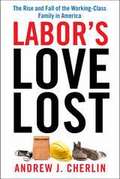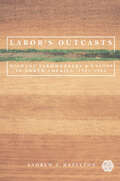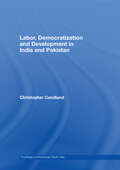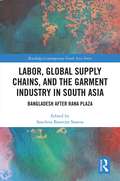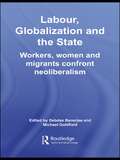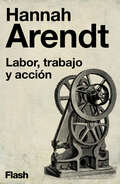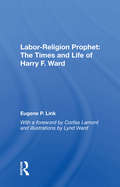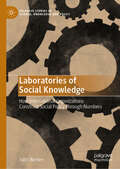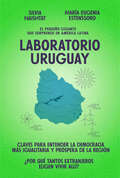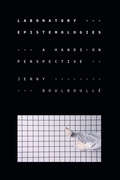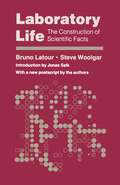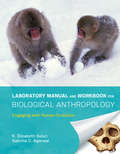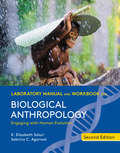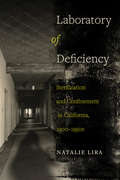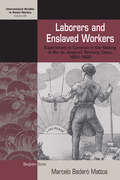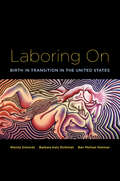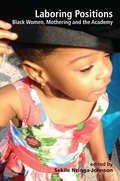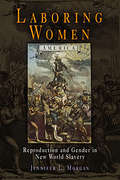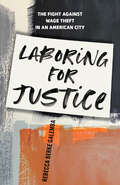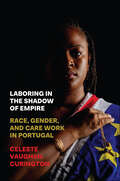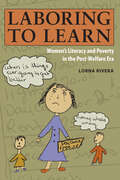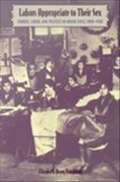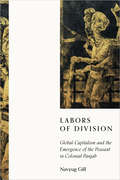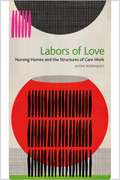- Table View
- List View
Labor's Love Lost: The Rise and Fall of the Working-Class Family In America
by Andrew J. CherlinTwo generations ago, young men and women with only a high-school degree would have entered the plentiful industrial occupations which then sustained the middle-class ideal of a male-breadwinner family. Such jobs have all but vanished over the past forty years, and in their absence ever-growing numbers of young adults now hold precarious, low-paid jobs with few fringe benefits. Facing such insecure economic prospects, less-educated young adults are increasingly forgoing marriage and are having children within unstable cohabiting relationships. This has created a large marriage gap between them and their more affluent, college-educated peers. In Labor's Love Lost, noted sociologist Andrew Cherlin offers a new historical assessment of the rise and fall of working-class families in America, demonstrating how momentous social and economic transformations have contributed to the collapse of this once-stable social class and what this seismic cultural shift means for the nation's future. Drawing from more than a hundred years of census data, Cherlin documents how today's marriage gap mirrors that of the Gilded Age of the late-nineteenth century, a time of high inequality much like our own. Cherlin demonstrates that the widespread prosperity of working-class families in the mid-twentieth century, when both income inequality and the marriage gap were low, is the true outlier in the history of the American family. In fact, changes in the economy, culture, and family formation in recent decades have been so great that Cherlin suggests that the working-class family pattern has largely disappeared. Labor's Love Lost shows that the primary problem of the fall of the working-class family from its mid-twentieth century peak is not that the male-breadwinner family has declined, but that nothing stable has replaced it. The breakdown of a stable family structure has serious consequences for low-income families, particularly for children, many of whom underperform in school, thereby reducing their future employment prospects and perpetuating an intergenerational cycle of economic disadvantage. To address this disparity, Cherlin recommends policies to foster educational opportunities for children and adolescents from disadvantaged families. He also stresses the need for labor market interventions, such as subsidizing low wages through tax credits and raising the minimum wage. Labor's Love Lost provides a compelling analysis of the historical dynamics and ramifications of the growing number of young adults disconnected from steady, decent-paying jobs and from marriage. Cherlin's investigation of today's "would-be working class" shines a much-needed spotlight on the struggling middle of our society in today's new Gilded Age.
Labor's Outcasts: Migrant Farmworkers and Unions in North America, 1934-1966 (Working Class in American History)
by Andrew J. HazeltonIn the mid-twentieth century, corporations consolidated control over agriculture on the backs of Mexican migrant laborers through a guestworker system called the Bracero Program. The National Agricultural Workers Union (NAWU) attempted to organize these workers but met with utter indifference from the AFL-CIO. Andrew J. Hazelton examines the NAWU's opposition to the Bracero Program against the backdrop of Mexican migration and the transformation of North American agriculture. His analysis details growers’ abuse of the program to undercut organizing efforts, the NAWU's subsequent mobilization of reformers concerned by those abuses, and grower opposition to any restrictions on worker control. Though the union's organizing efforts failed, it nonetheless created effective strategies for pressuring growers and defending workers’ rights. These strategies contributed to the abandonment of the Bracero Program in 1964 and set the stage for victories by the United Farm Workers and other movements in the years to come.
Labor, Democratization and Development in India and Pakistan (Routledge Contemporary South Asia Series)
by Christopher CandlandIn this first comparative study of organized labor in India and Pakistan, the author analyses the impact and role of organized labor in democratization and development. The study provides a unique comparative history of Indian and Pakistani labor politics. It begins in the early twentieth century, when permanent unions first formed in the South Asian Subcontinent. Additionally, it offers an analysis of changes in conditions of work andterms of service in India and Pakistan and of organized labor’s response. The conclusions shed new light on the influence of organized labor in national politics, economic policy, economic welfare and at the workplace. It is demonstrated that the protection of workers has desirable outcomes not only for those workers covered but also for democratic practice and for economic development.
Labor, Global Supply Chains and the Garment Industry in South Asia: Bangladesh after Rana Plaza (Routledge Contemporary South Asia Series)
by Sanchita Banerjee SaxenaThis book argues that larger flaws in the global supply chain must first be addressed to change the way business is conducted to prevent factory owners from taking deadly risks to meet clients’ demands in the garment industry in Bangladesh. Using the 2013 Rana Plaza disaster as a departure point, and to prevent such tragedies from occurring in the future, this book presents an interdisciplinary analysis to address the disaster which resulted in a radical change in the functioning of the garment industry. The chapters present innovative ways of thinking about solutions that go beyond third-party monitoring. They open up possibilities for a renewed engagement of international brands and buyers within the garment sector, a focus on direct worker empowerment using technology, the role of community-based movements, developing a model of change through enforceable contracts combined with workers movements, and a more productive and influential role for both factory owners and the government. This book makes key interventions and rethinks the approaches that have been taken until now and proposes suggestions for the way forward. It engages with international brands, the private sector, and civil society to strategize about the future of the industry and for those who depend on it for their livelihood. A much-needed review and evaluation of the many initiatives that have been set up in Bangladesh in the wake of Rana Plaza, this book is a valuable addition to academics in the fields of development studies, gender and women’s studies, human rights, poverty and practice, political science, economics, sociology, anthropology, and South Asian studies.
Labor, Globalization and the State: Workers, Women and Migrants Confront Neoliberalism (Routledge Contemporary South Asia Series #Vol. 5)
by Debdas Banerjee Michael GoldfieldThis book explores the impact of neoliberal globalization on labour markets and the state in the developed and developing world. It focuses especially on the United States and the economies of Asia – in particular, India. Liberalized trade and investment are thought by neoliberals to be the best levers for raising labour standards, provided labour market flexibility and capital market restructuring accompany them. Labour market flexibility and capital market restructuring, at a first glance, appear to be complementary and symmetric policies. In practice, however, they might have very asymmetric consequences. This book addresses these issues, and it presents a comprehensive analysis of the key questions such as: How far is globalization a ‘real’ threat to the conventional systems of wage fixation, employment pattern, and basic rights at work in both developed, as well as underdeveloped countries? Are casualization and informalization of the workforce direct outcomes of deregulation? How do labour organizations cope with the volatility of the labour market? Are the existing labour market conditions and forms of labour organizations misfits in the globalized business world? Is it at all feasible to choose a high road that combines some degree of labour market flexibility with better labour standards? This book will be of interest to academics working on International Development, Development Economics, Political Economy, Comparative Labour Studies and Asian Studies.
Labor, trabajo y acción
by Hannah ArendtFlash publica uno de los textos más representativos del pensamiento de Hannah Arendt. Un ensayo que reinterpreta los conceptos de labor, trabajo y acción en su relación con el ser humano a lo largo de la historia de la humanidad. «Es el momento de aprovechar esta oportunidad para pensar en lo que es un trabajo valioso de verdad». Enrique Zamorano, El Confidencial En este texto, recogido en La pluralidad del mundo, Hannah Arendt reflexiona sobre el significado del trabajo y su relación con el ser humano a lo largo del tiempo. La filósofa toma como base el concepto de vida activa y cómo en esta se desarrollan los tres medios (labor, trabajo y acción) con los que alcanzar el «ideal» al que los griegos aspiraban desde la era pre-filosófica: una vida contemplativa, aquella que les podría otorgar calma, paz interior y claridad de pensamiento. No obstante, Arendt da un paso más allá y trata de desmontar esa jerarquía donde prevaleció durante siglos la contemplación y la calma. ¿Y si la vida activa fuera inherente al ser humano? ¿Y si estamos predestinados a la actividad para mantenernos vivos? ¿No deberíamos resignificar nuestros valores? Con estas preguntas, Arendt examina los tres conceptos que ponen en el centro al ser humano y su relación con el entorno: la labor, como una actividad rutinaria y necesaria para la supervivencia del individuo; el trabajo, como el esfuerzo que produce un mundo con objetos sólidos y perdurables, que sobreviven a la finitud de los organismos vivos; la acción, intrínseca a los seres humanos desde que nacemos, porque estamos condenados a relacionarnos y nuestros actos tienen causas y consecuencias infinitas. A través del estudio y la separación de estas tres ideas, Arendt pone en valor la vida activa para comprender que no se puede prescindir de ella en pro de la contemplación, puesto que reivindicar la labor, el trabajo y la acción es reivindicar nuestra propia libertad como individuos en el mundo. Sobre La pluralidad del mundo: «Hoy, como entonces, el vocabulario que empleó Arendt para pensar y narrar el mundo, sus reflexiones y esa escritura tan bella, tan suya, nos ayudan a interpretar lo que nos ocurre, aunque solo sea como simples enanos mirando el mundo a hombros de gigantes. Ella, desde luego, lo fue.»Máriam Martínez-Bascuñán, Babelia, El País «Hannah Arendt volvió a pensar el espacio público después de su destrucción y nosotros debemos volver a ella para prevenir que se destruya de nuevo.»Andreu Jaume «Judía y alemana, Hannah Arendt reflexiona sobre la ascensión del nazismo y la ceguera de no haber visto a tiempo su peligro.»César Antonio Molina, ABC Sobre La libertad de ser libres: «Este ensayo recién redescubierto es como una petición de compromiso político en la era de Trump.»Die Zeit «Pese a haber sido escrito hace cincuenta años, es tan moderno que parece pensado para la actualidad política mundial.»Westdeutscher Rundfunk «Un ensayo inspirador de una relevancia extraordinaria, especialmente en tiempos en que se cuestionan los valores liberales del orden democrático.»Philosophie Sobre Eichmann en Jerusalén: «Es historia, es pensamiento y es advertencia -aún hoy- sobre las consecuencias de la banalidad del mal, de la que a pesar de lo vivido, no estamos vacunados.»Laura Barrachina, RNE «Un ensayo imprescindible. Arendt no se olvida de nadie.»Marta Michel, El Mundo - Yo Dona «En vez de defender la causa de su pueblo de manera incondicional, Arendt se puso a reflexionar, investigar y debatir. En palabras de Aristóte
Labor-religion Prophet: The Times And Life Of Harry F. Ward
by Eugene P LinkAs first national chairman of the American Civil Liberties Union, the first professor of Christian ethics at both Boston University and Union Theological Seminary, and a pioneer of dialogs between religion and Marxism, Harry F. Ward led a life marked with many milestones. An advocate of the working-class and the underprivileged, Ward avoided the do
Laboratories of Social Knowledge: How International Organizations Construct Social Policy Through Numbers (Palgrave Studies in Science, Knowledge and Policy)
by John BertenThe book examines the politics of knowledge in global social policy, investigating how international organisations (IOs) have contributed to the emergence and development of social security as a global policy field. It reconstructs the role of numerical knowledge in the International Labour Organization (ILO) and the World Bank, theorising how IOs contribute to epistemic infrastructures of global social security. The book shows how IOs&’ knowledge production has led to a continuous refinement of the meaning and purpose of social security. First, it reveals how IOs arrived at a shared conception of social security: what the book calls an ontological framework. Second, it traces how numbers have increasingly enabled the assessment of countries according to shared benchmarks: what the book calls an evaluative framework. The author demonstrates the political and epistemic work involved in universalising knowledge of social security, while highlighting the limits of governing by numbers in global social policy.
Laboratorio Uruguay: El pequeño gigante que sorprende en América Latina
by Silvia Naishtat María Eugenia EstenssoroUn recorrido fascinante por el laboratorio político, económico, social y cultural más exitoso y sugestivo del momento: Uruguay, ese edén sudamericano que se abre camino con mesura en medio de una región convulsionada. A partir de 2020, la Argentina comenzó a asistir a un fenómeno inédito: la emigración a Uruguay de un creciente número de destacados emprendedores tecnológicos, profesionales con excelentes empleos y dueños de poderosos grupos económicos. Ya no se trataba de perseguidos políticos o de desempleados, como había ocurrido en épocas anteriores, sino de personas que, por su solvencia financiera y su experiencia empresarial, movían la economía generando innovación, trabajo y riqueza. ¿Por qué, pudiendo vivir en Nueva York, Londres, París o Tel Aviv, ellos elegían Punta del Este, José Ignacio, Montevideo y hasta Colonia del Sacramento? Silvia Naishtat y María Eugenia Estenssoro se propusieron dilucidar las claves detrás de la novedosa elección de vida de muchos argentinos (y la fantasía de otros) y el resultado es un libro revelador. Con abundante información y el testimonio de sus protagonistas -desde Julio Bocca a "los Messi" del campo y los unicornios tecnológicos-, como también de notables personalidades de la política uruguaya, logran contagiar su admiración por "el pequeño gigante latinoamericano", sin imaginar por ello un destino contrapuesto para la Argentina: "No creemos en las antinomias, ellos y nosotros -dicen-. Más bien, pretendemos derribar fronteras y barreras para aprovechar nuestra potencia cuando creamos, trabajamos y mateamos juntos".
Laboratory Epistemologies: A Hands-On Perspective (Experimental Futures)
by Jenny BoulboulléIn Laboratory Epistemologies: A Hands-On Perspective, Jenny Boulboullé examines the significance of hands-on experiences in contemporary life sciences laboratories. Addressing the relationship between contemplation and manipulation in epistemology, Boulboullé combines participant observations in molecular genetics labs and microbiological cleanrooms with a longue durée study of the history and philosophy of science. She radically rereads Descartes’s key epistemological text Meditations on First Philosophy, reframing the philosopher as a hands-on knowledge maker. With this reading, Boulboullé subverts the pervasive modern conception of the disembodied knower and puts the hands-on experimenter at the heart of life sciences research. In so doing, she contributes a theoretical model for understanding how life processes on cellular and molecular levels are manually produced in today’s techno-scientific spaces. By reassessing the Cartesian legacy and arguing that epistemology should be grounded in the standpoint of a hands-on practitioner, Boulboullé offers the philosophical and historical foundation to understand and study contemporary life sciences research as multisensory embodied practices.
Laboratory Life: The Construction of Scientific Facts
by Steve Woolgar Bruno LatourThis highly original work presents laboratory science in a deliberately skeptical way: as an anthropological approach to the culture of the scientist. Drawing on recent work in literary criticism, the authors study how the social world of the laboratory produces papers and other "texts,"' and how the scientific vision of reality becomes that set of statements considered, for the time being, too expensive to change. The book is based on field work done by Bruno Latour in Roger Guillemin's laboratory at the Salk Institute and provides an important link between the sociology of modern sciences and laboratory studies in the history of science.
Laboratory Manual and Workbook for Biological Anthropology
by Sabrina C. Agarwal K. Elizabeth SoluriThe perfect lab solution. A vividly illustrated, flexible, and topically balanced manual with a critical-thinking approach
Laboratory Manual and Workbook for Biological Anthropology (Second Edition): Engaging With Human Evolution
by Sabrina C. Agarwal K. Elizabeth SoluriThe most popular and affordable manual, now more hands-on than ever! The #1 manual for biological anthropology, Soluri/Agarwal has become even more visual and hands-on in its Second Edition. Whether used standalone or packaged with a Norton textbook, Soluri/Agarwal is the most affordable manual for students. This purchase offers access to the digital ebook only.
Laboratory of Deficiency: Sterilization and Confinement in California, 1900–1950s (Reproductive Justice: A New Vision for the 21st Century #6)
by Natalie LiraPacific Colony, a Southern California institution established to care for the "feebleminded," justified the incarceration, sterilization, and forced mutilation of some of the most vulnerable members of society from the 1920s through the 1950s. Institutional records document the convergence of ableism and racism in Pacific Colony. Analyzing a vast archive, Natalie Lira reveals how political concerns over Mexican immigration—particularly ideas about the low intelligence, deviant sexuality, and inherent criminality of the "Mexican race"—shaped decisions regarding the treatment and reproductive future of Mexican-origin patients. Laboratory of Deficiency documents the ways Mexican-origin people sought out creative resistance to institutional control and offers insight into how race, disability, and social deviance have been called upon to justify the confinement and reproductive constraint of certain individuals in the name of public health and progress.
Laborers and Enslaved Workers: Experiences in Common in the Making of Rio de Janeiro's Working Class, 1850-1920
by Marcelo Badaró MattosFrom the middle of the nineteenth century until the 1888 abolition of slavery in Brazil, Rio de Janeiro was home to the largest urban population of enslaved workers anywhere in the Americas. It was also the site of an incipient working-class consciousness that expressed itself across seemingly distinct social categories. In this volume, Marcelo Badaró Mattos demonstrates that these two historical phenomena cannot be understood in isolation. Drawing on a wide range of historical sources, Badaró Mattos reveals the diverse labor arrangements and associative life of Rio's working class, from which emerged the many strategies that workers both free and unfree pursued in their struggles against oppression.
Laboring On: Birth in Transition in the United States (Perspectives on Gender)
by Barbara Katz Rothman Wendy Simonds Bari Meltzer NormanFacing the polar forces of an epidemic of Cesarean sections and epidurals and home-like labor rooms, American birth is in transition. Caught between the most extreme medicalization — best seen in a Cesarean section rate of nearly 30 percent — and a rhetoric of women’s "choices" and "the natural," women and their midwives, doulas, obstetricians, and nurses labor on. Laboring On offers the voices of all of these practitioners, all women trying to help women, as they struggle with this increasingly split vision of birth. Updating Barbara Katz Rothman's now-classic In Labor, the first feminist sociological analysis of birth in the United States, Laboring On gives a comprehensive picture of the ever-changing American birth practices and often conflicting visions of birth practitioners. The authors deftly weave compelling accounts of birth work, by midwives, doulas, obstetricians, and nurses, into the larger sociohistorical context of health care practices and activism and offer provocative arguments about the current state of affairs and the future of birth in America.
Laboring Positions: Black Women, Mothering And The Academy
by Sekile Nzinga-JohnsonLaboring Positions aims to disrupt the dominant discourse on academic women’s mothering experiences. Black women’s maternity is assumed, and yet is also silenced within the disembodied, patriarchal, racist, antifamily, and increasingly neoliberal work environment of academia. This volume acknowledges the salience of the institutional challenges facing contemporary caregiving academics; yet it is centrally concerned with expanding the academic mothering conversation by speaking against the private/public spheres approach. Laboring Positions does so by privileging the hybridity between Black women’s mothering experiences and their working lives within and beyond the academy. The collection also intentionally blurs essentialist boundaries of mother and “other”, which dictates and generates alternate border zones of knowledge production concerning Black academic women’s working lives. In doing so, the diverse perspectives captured herein offer us cogent starting points from which to interrogate the interlocking cultural, political, and economic hierarchies of the academy. The editorial goal of Laboring Positions is to offer a polyvocal collection embodying themes that privilege and arouse Black mothering as central in the narratives, research, and models of existence and resistance for Black women’s survival within the academy. The contributors utilize a wide variety of methods and perspectives including Black feminist theory, intersectional feminism, Womanist research ethics, hip-hop feminism, African-centered epistemologies, literary analysis, autoethnography, policy analysis, memoir, qualitative research, survival strategies and frameworks, and situated testimony that are all collectively bound by Black women’s intellectual lives, activist impulses, and experiences of mothering or being mothered. The critical embodied perspectives herein serve as evidence that Black women exist beyond the institutional and ideological boundaries that have attempted to define their journeys. Laboring Positions’ chapters speak to each other and some conversations are louder than others; yet together they offer us a complexly nuanced portrait of the emergent literature on race, gender, mothering, and work.
Laboring Women: Reproduction and Gender in New World Slavery
by Jennifer L. MorganWhen black women were brought from Africa to the New World as slave laborers, their value was determined by their ability to work as well as their potential to bear children, who by law would become the enslaved property of the mother's master. In Laboring Women: Reproduction and Gender in New World Slavery, Jennifer L. Morgan examines for the first time how African women's labor in both senses became intertwined in the English colonies. Beginning with the ideological foundations of racial slavery in early modern Europe, Laboring Women traverses the Atlantic, exploring the social and cultural lives of women in West Africa, slaveowners' expectations for reproductive labor, and women's lives as workers and mothers under colonial slavery.Challenging conventional wisdom, Morgan reveals how expectations regarding gender and reproduction were central to racial ideologies, the organization of slave labor, and the nature of slave community and resistance. Taking into consideration the heritage of Africans prior to enslavement and the cultural logic of values and practices recreated under the duress of slavery, she examines how women's gender identity was defined by their shared experiences as agricultural laborers and mothers, and shows how, given these distinctions, their situation differed considerably from that of enslaved men. Telling her story through the arc of African women's actual lives—from West Africa, to the experience of the Middle Passage, to life on the plantations—she offers a thoughtful look at the ways women's reproductive experience shaped their roles in communities and helped them resist some of the more egregious effects of slave life.Presenting a highly original, theoretically grounded view of reproduction and labor as the twin pillars of female exploitation in slavery, Laboring Women is a distinctive contribution to the literature of slavery and the history of women.
Laboring for Justice: The Fight Against Wage Theft in an American City
by Rebecca Berke GalembaLaboring for Justice highlights the experiences of day laborers and advocates in the struggle against wage theft in Denver, Colorado. Drawing on more than seven years of research that earned special recognition for its community engagement, this book analyzes the widespread problem of wage theft and its disproportionate impact on low-wage immigrant workers. Rebecca Galemba focuses on the plight of day laborers in Denver, Colorado—a quintessential purple state that has swung between some of the harshest and more welcoming policies around immigrant and labor rights. With collaborators and community partners, Galemba reveals how labor abuses like wage theft persist, and how advocates, attorneys, and workers struggle to redress and prevent those abuses using proactive policy, legal challenges, and direct action tactics. As more and more industries move away from secure, permanent employment and towards casualized labor practices, this book shines a light on wage theft as symptomatic of larger, systemic issues throughout the U.S. economy, and illustrates how workers can deploy effective strategies to endure and improve their position in the world amidst precarity through everyday forms of convivencia and resistance. Applying a public anthropology approach that integrates the experiences of community partners, students, policy makers, and activists in the production of research, this book uses the pressing issue of wage theft to offer a methodologically rigorous, community-engaged, and pedagogically innovative approach to the study of immigration, labor, inequality, and social justice.
Laboring in the Shadow of Empire: Race, Gender, and Care Work in Portugal (Inequality at Work: Perspectives on Race, Gender, Class, and Labor)
by Celeste Vaughan CuringtonLaboring in the Shadow of Empire: Race, Gender, and Care Work in Portugal examines the everyday lives of an African-descendant care service workforce that labors in an ostensibly “anti-racial” Europe and against the backdrop of the Portuguese colonial empire. While much of the literature on global care work has focused on Asian and Latine migrant care workers, there is comparatively less research that explicitly examines African care workers and their migration histories to Europe. Sociologist Celeste Vaughan Curington focuses on Portugal—a European setting with comparatively liberal policies around family settlement and naturalization for migrants. In this setting, rapid urbanization in the late twentieth century, along with a national push to reconcile work and family, has shaped the growth of paid home care and cleaning service industries. Many researchers focus on informal work settings, where immigrant rights are restricted and many workers are undocumented or without permanent residence status. Curington instead examines workers who have accessed citizenship or permanent residence status and also explores African women’s experiences laboring in care and service industries in the formal market, revealing how deeply colonial and intersectional logics of a racialized and international division of reproductive labor in Portugal render these women “hyper-invisible” and “hyper-visible” as “appropriate” workers in Lisbon.
Laboring to Learn: Women's Literacy and Poverty in the Post-Welfare Era
by Lorna RiveraThe American adult education system has become an alternative for school dropouts, with some state welfare policies requiring teen mothers and women without high school diplomas to participate in adult education programs to receive aid. Currently, low-income women of color are more likely to be enrolled in the lowest levels of adult basic education. Very little has been published about women's experiences in these mandatory programs and whether the programs reproduce the conditions that forced women to drop out in the first place. Lorna Rivera bridges the gap with this important study, the product of ten years' active ethnographic research with formerly homeless women who participated in adult literacy education classes before and after welfare reform. She draws on rich interviews with organizers and participants in the Adult Learners Program at Project Hope, a women's shelter and community development organization in Boston's Dudley neighborhood, one of the poorest in the city. Analyzing the web of ideological contradictions regarding "work first" welfare reform policies, Rivera argues that poverty is produced and reproduced when women with low literacy skills are pushed into welfare-to-work programs and denied education. She examines how various discourses about individual choice and self-sufficiency shape the purposes of literacy, how low-income women express a sense of personal responsibility for being poor, and how neoliberal ideologies and practices compromise the goals of critical literacy programs. Throughout this study, the voices and experiences of formerly homeless women challenge cultural stereotypes about poor women, showing in personal and structural terms how social and economic forces shape and restrict opportunities for low-income women of color.
Labors Appropriate to Their Sex: Gender, Labor, and Politics in Urban Chile, 1900-1930
by Elizabeth Quay HutchisonIn Labors Appropriate to Their Sex Elizabeth Quay Hutchison addresses the plight of working women in early twentieth-century Chile, when the growth of urban manufacturing was transforming the contours of women's wage work and stimulating significant public debate, new legislation, educational reform, and social movements directed at women workers. Challenging earlier interpretations of women's economic role in Chile's industrial growth, which took at face value census figures showing a dramatic decline in women's industrial work after 1907, Hutchison shows how the spread of industrial sweatshops and changing definitions of employment in the census combined to make female labor disappear from census records at the same time that it was in fact burgeoning in urban areas. In addition to population and industrial censuses, Hutchison culls published and archival sources to illuminate such misconceptions and to reveal how women's paid labor became a locus of anxiety for a society confronting social problems--both real and imagined--that were linked to industrialization and modernization. The limited options of working women were viewed by politicians, elite women, industrialists, and labor organizers as indicative of a society in crisis, she claims, yet their struggles were also viewed as the potential springboard for reform. Labors Appropriate to Their Sex thus demonstrates how changing norms concerning gender and work were central factors in conditioning the behavior of both male and female workers, relations between capital and labor, and political change and reform in Chile. This study will be rewarding for those whose interests lie in labor, gender, or Latin American studies; as well as for those concerned with the histories of early feminism, working-class women, and sexual discrimination in Latin America.
Labors of Division: Global Capitalism and the Emergence of the Peasant in Colonial Panjab (South Asia in Motion)
by Navyug GillOne of the most durable figures in modern history, the peasant has long been a site of intense intellectual and political debate. Yet underlying much of this literature is the assumption that peasants simply existed everywhere, a general if not generic group, traced backward from modernity to antiquity. Focused on the transformation of Panjab during the nineteenth and early twentieth centuries, this book accounts for the colonial origins of global capitalism through a radical history of the concept of "the peasant," demonstrating how seemingly fixed hierarchies were in fact produced, legitimized, and challenged within the preeminent agricultural region of South Asia. Navyug Gill uncovers how and why British officials and ascendant Panjabis disrupted existing forms of identity and occupation to generate a new agrarian order in the countryside. The notion of the hereditary caste peasant engaged in timeless cultivation thus emerged, paradoxically, as a result of a dramatic series of conceptual, juridical, and monetary divisions. Far from archaic relics, this book ultimately reveals both the landowning peasant and landless laborer to be novel political subjects forged through the encounter between colonialism and struggles over culture and capital within Panjabi society. Questions of progress, exploitation and knowledge come to animate the vernacular operations of power. With this history, Gill brings difference and contingency to understandings of the global past in order to re-think the itinerary of comparative political economy as well as alternative possibilities for emancipatory futures.
Labors of Love: Gender, Capitalism, and Democracy in Modern Arab Thought
by Susanna FergusonHow to raise a child became a central concern of intellectual debate from Cairo to Beirut over the course of the late nineteenth and early twentieth centuries. Intimately linked with discussions around capitalism and democracy, considerations about women, gender, and childrearing emerged as essential to modern social theory. Arab writers, particularly women, made sex, the body, and women's ethical labor central to fending off European imperial advances, instituting representative politics, and managing social order. Labors of Love traces the political power of motherhood and childrearing in Arabic thought. Susanna Ferguson reveals how debates around raising children became foundational to feminist, Islamist, and nationalist politics alike—opening up conversations about civilization, society, freedom, temporality, labor, and democracy. While these debates led to expansions in girls' education and women writers' authority, they also attached the fate of nations to women's unwaged labor in the home. Ferguson thus reveals why women and the family have been stumbling blocks for representative regimes around the world. She shows how Arab women's writing speaks to global questions—the devaluation of social reproduction under capitalism, the stubborn maleness of the liberal subject, and why the naturalization of embodied, binary gender difference has proven so difficult to overcome.
Labors of Love: Nursing Homes and the Structures of Care Work
by Jason RodriquezEvery day for the next twenty years, more than 10,000 people in the United States will turn 65. With life expectancies increasing as well, many of these Americans will eventually require round-the-clock attention—and we have only begun to prepare for the challenge of caring for them. In Labors of Love, Jason Rodriquez examines the world of the fast-growing elder care industry, providing a nuanced and balanced portrait of the day-to-day lives of the people and organizations that devote their time to supporting America’s aging population. Through extensive ethnographic research, interviews with staff and management, and analysis of internal documents, Rodriquez explores the inner workings of two different nursing homes—one for-profit and one non-profit—to understand the connections among the administrative regulations, the professional requirements, and the type of care provided in both types of facilities. He reveals a variety of challenges that nursing home care workers face day to day: battles over the budget; the administrative hurdles of Medicaid and Medicare; the employees’ struggle to balance financial stability and compassionate care for residents. Yet, Rodriquez argues, nursing home workers give meaning and dignity to their work by building emotional attachments to residents and their care. An unprecedented study, Labors of Love brings new insight into the underlying structures of a crucial and expanding sector of the American health care system.
